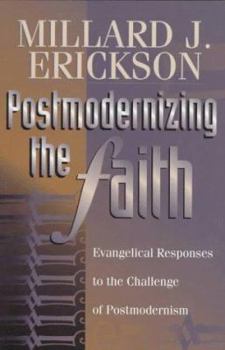Postmodernizing the Faith: Evangelical Responses to the Challenge of Postmodernism
Select Format
Select Condition 
Book Overview
The dean of evangelical theologians explores six evangelical responses-both positive and negative-to postmodernism. This description may be from another edition of this product.
Format:Paperback
Language:English
ISBN:0801021642
ISBN13:9780801021640
Release Date:February 1998
Publisher:Baker Academic
Length:163 Pages
Weight:0.55 lbs.
Dimensions:0.5" x 5.5" x 8.5"
Age Range:18 years and up
Grade Range:Postsecondary and higher
Customer Reviews
3 ratings
Postmoderns Need to Posit Their Presuppositions
Published by Thriftbooks.com User , 23 years ago
What is so outstanding about this volume is how the author points out what is the most glaring failure of this movement, namely its unawareness or unacknowledgement of its own Control Beliefs, Premises, Presuppositions, Historical Context, Philosophical/Metaphysical Bent which so heavily shape its content and conclusions. What is needed for any theological/doctrinal system that challenges evangelical/historical positions is a declaration,discussion and defense of such presuppositions, how they compare to the competition and why theirs are more plausible/tenable. Until postmodernism and other movements such as neotheism can engage at this fundamental level, any meaningful dialog with reality and Biblical truth is futile. Recommended highly to stimulate further research in this challenging arena.
Good overview
Published by Thriftbooks.com User , 23 years ago
In Postmodernizing the Faith, Erickson provides an summary and analysis of six evangelical theologians and their responses to postmodernism. He begins with those thinkers who have reacted negatively to postmodernism. David Wells, of Gordon-Conwell Theological Seminary, the first writer Erickson deals with, urges a strong rejection of postmodernism, with its pluralistic and relativistic trends. His analysis is historical, cultural, and sociological and mainly attempts to show the many ways that evangelicals have been negatively influenced by postmodernism. Erickson criticizes Wells for neglecting to offer a real solution, and for his failure to engage the deeper epistemological issues that are the root cause of much postmodern thought. Erickson next turns to Thomas Oden, once a flaming liberal but now a converted paleo-orthodox thinker. Oden urges Christians to reject much postmodernism as simply ultramodernism, the last dying gasp of modernist nihilism. In its place, he exhorts Christians to recapture the greatness of their tradition. His solution is not a simple return to premodernity but rather a postcritical appreciation of premodernity. Francis Schaeffer is the third evangelical Erickson looks at. At L'Abri in Switzerland, Schaeffer dealt with the early European manifestations of postmodernism. In his major works he emphasized the need for Christians to defend the classical concepts of antithesis and absolute/objective truth. His apologetic attempted to drive the non-Christian to live consistently according to his presuppositions, which would prove impossible, because on atheistic premises, suicide is the only logical option. The second section of the book examines three thinkers who have embraced postmodernism, or at least parts of it. Stanley Grenz, author of the Primer on Postmodernism, advocates an end to the dry propositionalism/rationalism and destructive individualism/dualism of classic evangelicalism. He thinks that evangelicals have tied themselves to closely to Enlightenment thought - an alliance that will bring their downfall. He proposes a communitarian approach to Christianity and a revisioning of theology for the 21st century. Brian J. Walsh and Richard Middleton also take a positive view of postmodernism. Their concern is to justify Christianity in the face of the postmodern charge that the Biblical worldview is a violent totalizing metanarrative. Their hermeneutic reflects this desire. They go to lengths to eliminate the sovereignty of God, the conquest of Canaan, and the more violent aspects of revelation. They also adhere to the narrative based theology of Frei and Lindbeck. Lastly, Erickson analyzes the thought of Keith Putt, a prof at Southwestern Baptist Theological Seminary. Putt is an enthusiastic supporter of the deconstructionist project. His whacked-out reading of Scripture leads him to a theopassional theology that is virtually indistinguishable from process a/theology. Ericks
A Great Place to Start!
Published by Thriftbooks.com User , 24 years ago
"Postmodernism". Contemporary Christians, particularly those of us who move about in academic circles, are hearing this perplexing term ringing in our ears with increasing regularity. Yet, for many of us, a great deal of confusion still exists regarding the precise meaning of this word. Many of us are uncertain as to how we should respond to the intellectual challenges Postmodernism presents. In "Postmodernizing the Faith", Erickson endeavors to provide some clarity amidst this confusion. Following an introductory chapter in which Erickson briefly outlines the development and foundational tenets of Postmodernism, he proceeds by devoting the next six chapters to the purpose of surveying various "evangelical" responses to the epistemological challenges of postmodernism (i.e., the views of D. Wells, T. Oden, F. Schaeffer, S. Grenz, J. R. Middleton & B. J. Walsh, and B. K. Putt). In characteristic fashion, Erickson provides a fair and accurate summary of each theologian's views. At the conclusion of each chapter, he adds a critical evaluation of the arguments it introduces. Erickson must be commended for the constructive manner in which he goes about this; he seeks to illuminate not only the "negatives" that he finds in the thoughts of other scholars, but also the "positives" (though, clearly, he find this much easier to accomplish in some cases than others!). Erickson concludes his text with a brief section in which he provides some summarizing ruminations concerning all that has been stated previously. My only disappointment with this section of the book lies in the fact that Erickson does not at any length attempt to construct and articulate his own response to Postmodernism. Yet, this is not his intent in writing to begin with. I would highly recomment this book to anyone looking to become introduced to the issues and personalities involved in the evangelical community's discussion about the Postmodernism challenge. This is a fine summary, and a great place to start. Without a doubt, it will serve as an effective springboard for further study.





